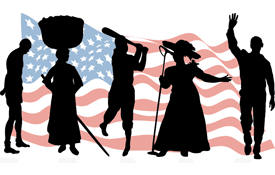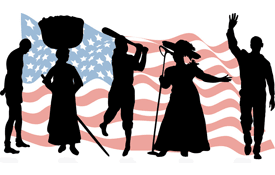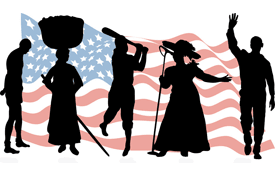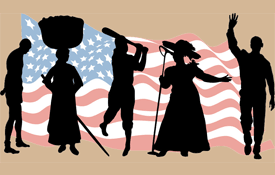Categories
-
0 African American Demographic Trends Exposed
- Research
- by Hugh Smith
- 02/03/2010
How many African Americans live in the USA? What percentage of African Americans older than 25 have at least a high school diploma? How many black Americans voted for Barack Obama? In 2007, BlackDemographics.com was created by Akiim DeShay to present US Census Bureau compiled facts and figures about African American lifestyles in a format that would be easy to use and understand. Throughout the year, and especially during Black History Month, BlackDemographics.com is a great resource for statistics relevant to all of the following areas: Population Black cities and states Employment Middle Class Housing Education Health Crime Geography Politics Religion The site is well designed and simple to use.
-
0 Iconic African Americans in Philadelphia Go Digital
- Research
- by Hugh Smith
- 06/24/2009
Audacious Freedom, African Americans in Philadelphia, 1776 - 1876, is a modest sized but creative new 2009 black history exhibit with a focus on 18th and 19th Century City of Brotherly Love legends. The African American Museum in Philadelphia, (just a block away from the National Constitution Center), is hosting this new permanent exhibit which opened on Juneteenth. On a recent Sunday, I toured the galleries and was pleasantly surprised by the electrified presence of 10 symbolic representatives of the era, who tell their stories in the first person, through the magic of digital video technology. Here is Octavious V. Catto, the post Civil War Philadelphia educator, talking to his audience. Each of the 10 historical figures recreated by actors comes alive in life-sized high definition screens. Visitors can press buttons on the kiosks to interact with the personalities who talk about the issues of their day. Kids have their own special area of the presentation allowing them to interact with the exhibit and experience how post Civil War kids connected with day-to-day living. According to AAMP President and CEO Romona Riscoe Benson, “Audacious Freedom gives us the opportunity to celebrate the richness of the culture and experiences of people of African descent.” Although the video elements are a highlight of the exhibit, visitors can still view traditional pictures, artifacts, and timelines documenting the rich contributions African Americans have made to Philadelphia's important history. Visit aampmuseum.org for more information.
-
0 Black History Month Highlights 2009
- Research
- by Hugh Smith
- 02/25/2009
Black History Month 2009 still has a few days to go. So far, we've had over 20,000 searches through our main website (BlackHistoryPeople.com) for interesting black history people. Here are our top 10 searches (in order) for February, 2009: Rosa Parks Harriet Tubman Martin Luther King Jr. Bill Cosby Barack Obama Jesse Owens Louis Armstrong Daisy Bates Jackie Robinson Thurgood Marshall Thanks for all of your excellent suggestions and feedback.
-
0 Martin Luther King Jr. Online Archive
- Research
- by Hugh Smith
- 01/14/2009
The MLK Jr. Archival Collaborative, an online home for the electronic display of the papers of Dr. Martin Luther King Jr., is now live on the Internet. Three institutions partnered to make this 'research rich' website happen: The Robert W. Woodruff Library of the Atlanta University Center The Howard Gotlieb Archival Center at Boston University The Martin Luther King, Jr. Research and Education Institute at Stanford University You can electronically search and view Dr. King's papers, writings, and documents housed in Atlanta, Georgia, and Boston, Massachusetts. The Boston University Dr. King archive alone includes more than 80,000 items. A few bugs exist in the online search system. I searched using the keywords "nobel prize." Several of the links that were returned were test links. In addition, there were quite a few server errors. I'm sure the technical problems will be resolved soon, as the site is only a day old as of this writing. Congratulations to the 3 institutions whose partnership made this historic black history website possible. 2018 update: The collaborative's links are broken, so we switched to the more reliable digital Martin Luther King Jr. Archive in Atlanta, Georgia, courtesy of the King Center instead.



